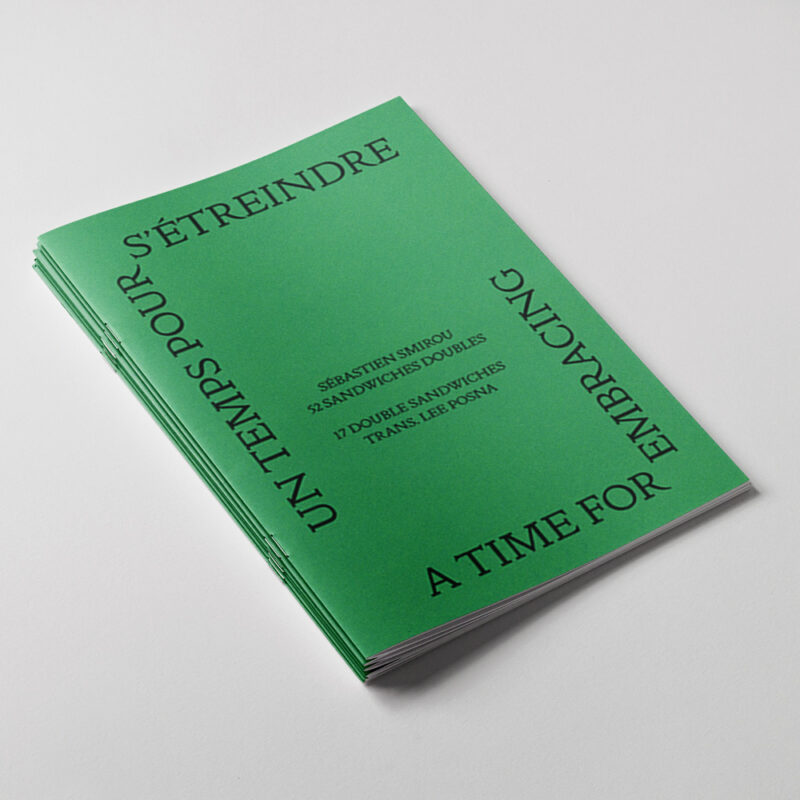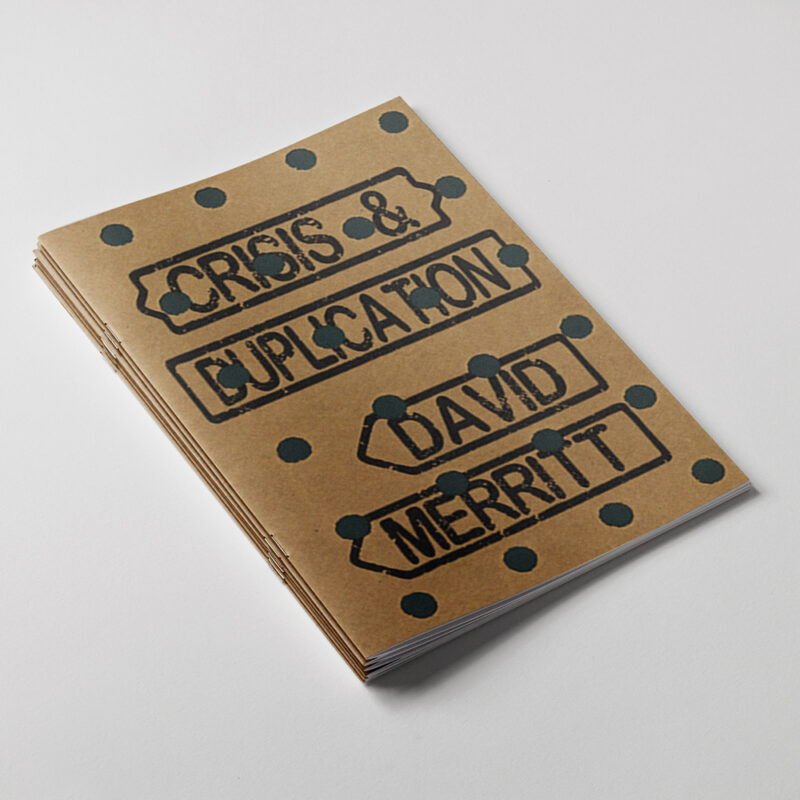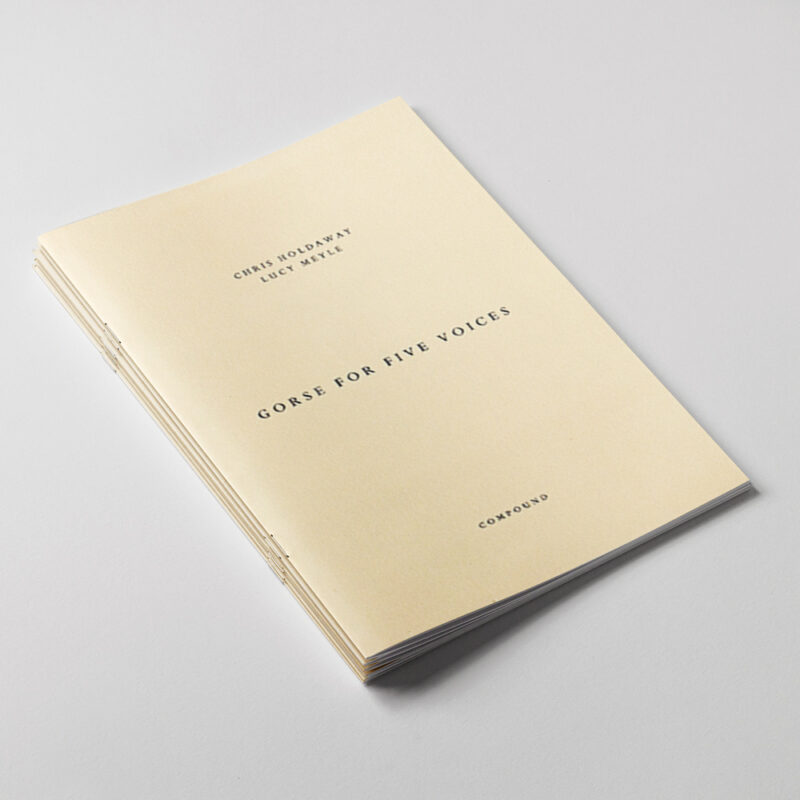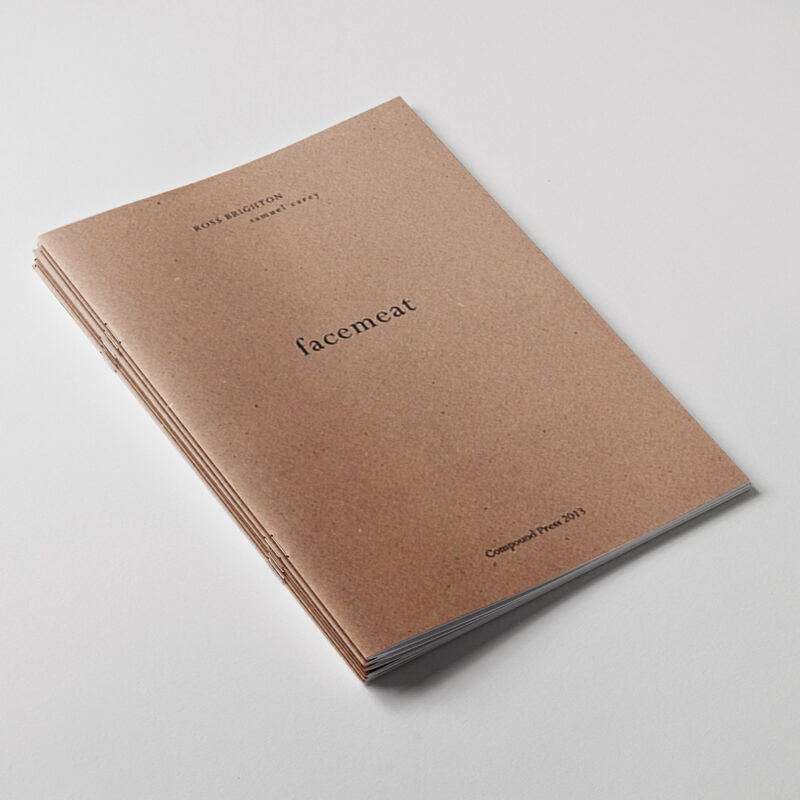Poems by Carolyn DeCarlo & Jackson Nieuwland
Published November 2014
28 pages, edition of 100
ISBN 9780994112323
Tracklist: You supposed to drown – Kanye; You remember where we first met? – Kanye & Kim; No leaving this party with nobody to love – Kim; Admitting is the first step – Kanye; Maybe we could make it to the church steps – Kim; You going to remember how to forget – Kanye; Watch your mouth – Kim (feat. North); One good girl – Kanye; Only here for her girl birthday – Kim; Bad reputation – Kanye; How you gon be mad on vacation – Kanye; Bound – Kanye & Kim.
Chris Holdaway: As I understand it, your Bound playfully re-enacts/-imagines/-remembers your own courtship in relation to that of “Kimye”, & Kanye’s Bound 2. When I first told someone about this project, they immediately thought it was beyond awesome, but then they went on to ask if Caro’s voice as a poet was projected through instances of Kim, & Jackson’s through Kanye. My own reaction was that there’s nothing quite so simple going on here w/r/t “gender”, to the point where I considered demanding this interview with Caro roleplaying Kanye & Jackson as Kim. With the exception of the dual/conversation structure in a poem like ‘You remember where we first met?’, there’s rarely any good reason to tease the poems apart into separate voices; this is a feature (at least to me) of your so-called ‘talk’ poems, & a signal of really tight collaboration. The “Tracklist” gives which poems are “Kim”, which ones are “Kanye”, & which ones are “duets”, but I didn’t take that as signalling divisions in authorship (maybe I’m wrong). I guess I don’t really have a pointed question here, but maybe you two would like to speak to how notions of identity work in these poems (as long as you don’t think that’d ruin things), especially if that’s something you have in mind during the writing process, with the resulting author/voice being something of a composite/continuum.
Carolyn DeCarlo & Jackson Nieuwland: We hate to break it to you but the basic premise of this poetic project is as simple as it seems. Caro has been watching Keeping up with the Kardashians since Season One first aired in 2007. Jackson has been memorising the lyrics to Kanye songs since The College Dropout. Our relationship with these two celebrities predates both their relationship and our relationship with each other. In the beginning stages of the writing process we each roleplayed as both Kim and Kanye but having Caro voice Kim’s poems and Jackson voice Kanye’s came more naturally to us. This was based more on what we could bring to the table for these two characters than any desire to box ourselves into gender norms.
While working on our Talk Poems was some of the most fun either of us has had while writing, this project was never meant to replicate that method. Every collaborative experience we’ve had has been different. When we wrote Twilight Zone, Caro was living in the States and Jackson was living in New Zealand and the most collaborative element of the project took place as we were sequencing the chapbook. Bound was much more interactive than that for us. We shut ourselves in a room for three days and wrote these poems side by side, sharing them with each other as we went. ‘You remember where we first met?’ was literally a conversation the two of us had. ‘Bound’ was written sentence by sentence, alternating between our two voices. Both of these are methods we hadn’t used before.
We don’t think that speaking about notions of identity should take away from anything a reader might glean from these poems. We did provide a tracklist, didn’t we? If anything, we’re more interested in making our collaborative process transparent. It seems like collaboration is often shrouded in mystery, but in this case we don’t think the process needs to be so mysterious—and neither do Kanye and Kim. After all, Kanye listed 21 people in the credits for his latest single, All Day.
CH: One topic I’m getting really interested in is “Afrofuturism”, as a banner for POC to challenge the particular kind of whiteness that dominates science fiction genres. Music seems particularly rich for this—Janelle Monae’s ArchAndroid alterego, & even back to the fisheye lens shots of Missy Elliott wearing that giant shiny black suit in her video for The Rain. Kanye also seems to be working with elements of a kind of lo-fi/cyberpunk. There’s a lot of astral imagery in these poems—the first line: “An uncharted planet caught me in its field of gravity”. Is this something you bring in yourselves, & if so, how do you see it relating to Kanye’s aesthetic? Or do you see this material as drawn from the fabric of Kanye’s video for ‘Bound 2’? Or something else?
CDC & JN: Afrofuturism seems like a complicated topic. It’s not one that we know much about, though we’re fans of many artists associated with it. Caro was listening to George Clinton as a thirteen year old, but in a much more passive way, and it’s interesting to reflect now on how much of an influence P-Funk has been. There’s a Buzzfeed article called “19 Science-Fiction and Fantasy Novels by Women of Color You Must Read” that’s been making the rounds on Facebook, you’ve probably seen it? We’ve thought a lot about the stereotype of the genre that sci-fi is “male” and fantasy is “female”, both in audience and authorship. Obviously, it’s not a stereotype we would ascribe to, but it’s something we admit we have considered more in the past than the race of the writer.
When reading sci-fi/fantasy, often it can feel like race is a ‘non-issue’ because of the amount of world building that goes into it—the separation from Earth-reality or inclusion of talking dragons, badgers, or alien life forms. But of course this isn’t the case. We’re just thinking now about the outrageous comments people made on Twitter about Rue after the first Hunger Games movie came out. Maybe for some, the separation between Earth and the fictional worlds can actually add to the whitewashing of the genre.
We agree that Kanye has included sci-fi elements in much of his work. One of the epigraphs for Bound is from the song ‘Spaceship’ from The College Dropout. The album art and promotional materials for Graduation feature Takashi Murakami’s futuristic art. His consistent use of auto-tune since 808’s & Heartbreaks has served to roboticize his voice. But while he’s done all of this, we weren’t consciously thinking about it when we came up with the premise of the chapbook.
The idea of Kanye as an alien came from internet conspiracy theories about rappers’ involvement with the Illuminati. Kanye asks his fans to “throw your diamonds in the sky if you feel the vibe”. Casting Kanye as a reptilian was the next logical step for us. After this decision was made, the narrative came easily. The video for ‘Bound 2’ was a jumping off point for the construction of this chapbook, but the song’s lyrics ended up being a lot more integral to it. Each of the poem titles were lifted directly from the song, and served as the totems upon which we were able to build the poems. Coming back to Afrofuturism now, it is easy for us to read these poems through the lens of race. Kanye becomes alien; North West, the key to the future.
CH: Another go-to topic I have is that of “violence” in poetry. Many of the more intimate moments in these poems also carry significant brutality. Like in ‘You going to remember how to forget’: “The incision extended / from pelvis to sternum. / I removed the appendix, / the spleen, and a kidney …” This is done by one body to another. Do you two have any feelings about how violence (in lit or otherwise) can stand in for broader ideas about personal human interaction? Or, more specifically, as this is “An ode to falling in love”, how might you be negotiating violence & intimacy as close neighbours?
CDC & JN: We see violence as a kind of blanket term used to describe a whole lot of different emotions, or the reactions to a lot of emotions. Kanye West the celebrity has had his fair share of outbursts. But when we think of Kanye and violence, the majority of the time he seems to be protecting his own. Maybe he’s shielding Nori from paparazzi or reacting to negative comments about Kim. A discussion of violence as a form of protection is more appealing to us than one of violence as a form of intimacy.
In Bound, the physical violence Kanye enacts upon Kim is of a surgical nature. It is agreed upon by both parties before it is enacted (we think). It is purposeful; it creates North. Without devolving into a discussion of Twilight or other inane anti-abortion literature, we acknowledge Kanye’s action is loaded with its own set of ethical issues. Reading this will make some people uncomfortable; it makes us uncomfortable. Not to mention, even, the fact that Kanye erases Kim’s memory of the procedure at the end of the poem—and, seemingly, without her consent. I guess what we are saying is violence is always complicated.
We didn’t set out to write a violent narrative or make Kanye into a kind of villain. In our particular narrative, though, he is an alien life form whose arrival on Earth is accidental. But once here, like many humans his purpose seems to be to blend in and breed. He kind of fails at one of these goals, but he brings peace to his home planet and that’s pretty great, right?



